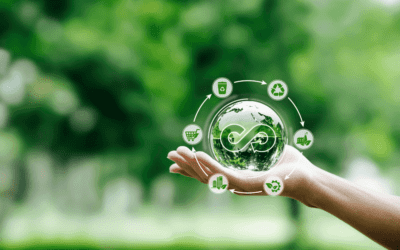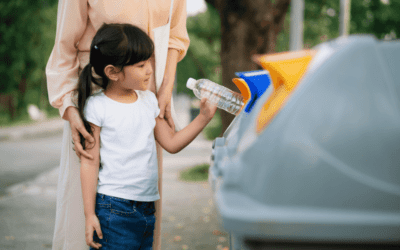ISB Response: Recycled plastic can be more toxic and is no fix for pollution, Greenpeace warns
In a recent article published by The Guardian, Greenpeace warns us that recycling alone may not be the ultimate solution to the plastic pollution crisis. The report highlights the potential toxicity of recycled plastic and emphasises the urgent need for alternative approaches. As advocates for sustainability and responsible environmental practices, we believe it is crucial to address this issue without undermining recycling efforts. Instead, we must shift our focus towards reusing, reducing the production and consumption of single-use plastic, and promoting the use of reusable plastics. In this article, we will explore the importance of these alternative strategies and showcase exemplary companies such as Yeti Bottles and Ocean Bottles that are leading the way.
The Limitations of Recycling: Recycling has long been championed as a key solution to plastic pollution, but it is essential to acknowledge its limitations. Greenpeace’s warning reminds us that recycling processes can inadvertently increase the toxicity of plastic, potentially posing risks to both human health and the environment. This highlights the need for improved recycling methods that prioritise the elimination of harmful substances and ensure the production of safer materials.
The Power of Reusing: While recycling plays a vital role in waste management, reusing offers a more sustainable approach. By extending the life cycle of products, we can significantly reduce the demand for new plastic production. Reusable products, such as Yeti Bottles and Ocean Bottles, serve as excellent examples of how individuals and companies can embrace sustainable alternatives. These durable and environmentally friendly products reduce plastic waste, helping to mitigate pollution and minimise our ecological footprint.
Reducing Single-Use Plastic: One of the most effective ways to tackle plastic pollution is by reducing the production and consumption of single-use plastic items. Items like food wrappers, beverage bottles, and plastic bags are major contributors to the problem. By exploring innovative packaging solutions and promoting biodegradable or compostable materials, we can significantly decrease the amount of plastic waste generated. Consider the example of Mars bar and then imagine if it were the norm for all on-the-go snacks to be packaged in a sustainable wrapper that decomposed harmlessly in the environment, eliminating its long-lasting impact.
The Value of The Circular Supply Network: In our pursuit of sustainable solutions to plastic pollution, it is crucial to highlight the value and importance of implementing a Circular Supply Network. At ISB Global, we have long recognized the significance of this approach, which aims to create a closed-loop system where resources are continuously reused and recycled. This not only reduces waste but also minimizes the demand for new raw materials, mitigating the environmental impact of plastic production.
The Circular Supply Network represents a paradigm shift in how we manage waste and resources. Instead of viewing waste as a problem to be disposed of, we see it as a valuable resource that can be reintroduced into the production cycle. By adopting this circular approach, we can effectively address the challenges posed by plastic pollution.
In our article titled Why Waste Matters: The Dangers of Ignoring the Waste Issue, we delve deeper into the significance of embracing the Circular Supply Network. The post emphasizes that ignoring the waste issue is not only detrimental to the environment but also undermines economic growth and social well-being. By shifting our mindset and implementing circular practices, we can unlock numerous benefits, including: Resource Conservation, Waste Reduction, Economic Opportunities and Consumer Engagement.
Progress in Plastic Pollution Reduction:
- Food Packaging: The food industry has made significant strides in developing sustainable packaging alternatives. Biodegradable food wrappers and compostable packaging materials are being adopted by numerous companies. Although challenges remain, progress in this area is promising.
- Single-Use Beverage Containers: Many countries and municipalities have implemented plastic bottle deposit systems and promoted the use of refillable containers. These initiatives encourage consumers to reuse bottles, reducing the number of discarded single-use containers.
- Microplastic Filtration: Technological advancements are being made to develop effective filtration systems that remove microplastics from wash streams and wastewater treatment plants. These efforts are vital in preventing microplastics from entering our waterways and ecosystems.
- Non-Toxic Alternatives: Industries are actively researching and developing non-toxic alternatives to plastic. By creating sustainable materials that have a minimal environmental impact and are safe for human use, we can reduce the harm caused by plastic pollution. Take a look at bottleup and their reusable bottle, completely BPA-free, made from sugar cane.
While the recent findings on the potential toxicity of recycled plastic remind us of the limitations of recycling alone, it is essential to approach this issue constructively. We must focus on reusing products, reducing single-use plastic, and promoting the use of reusable plastics and materials. Companies like Yeti Bottles, Ocean Bottles and BottleUp exemplify the positive impact that sustainable alternatives can have on reducing plastic waste. Simultaneously, efforts to improve recycling methods, develop filtration technologies, and explore non-toxic alternatives are crucial for our society to effectively address the plastic pollution crisis. By collectively embracing these strategies, we can pave the way towards a cleaner and more sustainable future.




